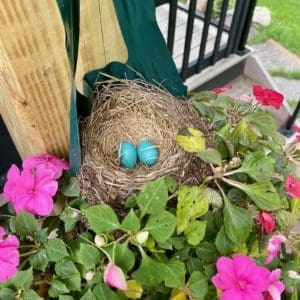
Minneapolis Livestream · Sunday, February 7, 2021 10:15 am
Unfolding Joy: The Joy of Searching
Sermon Pastor
Sermon Series
More In This Series
Biblical Book
Topic
More In This SeriesChrist With Us
More In This SeriesGood News
More In This SeriesResurrection
More In This Series
Mark 1:29-39
As soon as they left the synagogue, they entered the house of Simon and Andrew, with James and John. Now Simon’s mother-in-law was in bed with a fever, and they told him about her at once. He came and took her by the hand and lifted her up. Then the fever left her, and she began to serve them.
That evening, at sunset, they brought to him all who were sick or possessed with demons. And the whole city was gathered around the door. And he cured many who were sick with various diseases, and cast out many demons; and he would not permit the demons to speak, because they knew him.
In the morning, while it was still very dark, he got up and went out to a deserted place, and there he prayed. And Simon and his companions hunted for him. When they found him, they said to him, “Everyone is searching for you.” He answered, “Let us go on to the neighbouring towns, so that I may proclaim the message there also; for that is what I came out to do.” And he went throughout Galilee, proclaiming the message in their synagogues and casting out demons.
I hold fond memories from New Year’s Eve 2019. All my kids were home. My parents and sisters and their families and some friends celebrated together up North. It was a large group; great fun. Some of us gathered a little before midnight around a campfire down by the lake. We stood in close proximity to stay warm — no masks, just hats, mittens, coats and boots. Mesmerized by the flickering flames, thankful for the heat, we shifted our gaze from the fire in front of us to the stars above us — awe, wonder, gratitude. We reflected on 2019 and spoke out loud our chosen word for 2020: curiosity; serenity; intention; rededication … are a few I remember. In hindsight, we could have all agreed on the same word for 2020: survive!
In contrast, this year there were three of us. Our COVID bubble of my husband, one adult daughter, and me. Instead of a word for 2021 we landed on a challenge: what one new thing would we try in order to add interest to the countless blurred days of quarantine that were still ahead? I’ll admit — I’m the one who posed the challenge so I wasn’t really surprised when I was the only one who decided to accept it. I announced I was going to look for birds and learn about the ones I saw. It’s become a group project.
Now when my husband sits at his office desk at the cabin he keeps his telephoto lens nearby.
Check out what he’s captured in just one month. He took most of these — there’s only a couple that are of birds we’ve seen but whose photos I pulled from the web.

Pretty amazing, right? We are seeing and hearing all kinds of birds we’ve not noticed before. Of course, they’ve always been there; we just weren’t paying attention.
Has that phenomenon ever happened to you? There’s a name for it: the Baader-Meinhof phenomenon (also called frequency illusion or recency illusion). Example: You think about buying a new vehicle. You’re pretty excited about it. Maybe a certain kind of pick-up truck. And then suddenly, you see it everywhere. It’s parked in front of your house. Your colleague’s husband gets one. You see two of them in front of you at the stoplight. They might even pop up in a commercial later today during the Super Bowl. How did so many pick-up trucks start to appear?!? Then something called confirmation bias happens — after seeing it a couple of times, you start agreeing with yourself that you’re definitely seeing it more. When in fact, the only thing that’s happening is you’re paying attention differently.
The same thing is going on with the birdwatching for Tom and me. The birds aren’t new to the neighborhood. We’re just paying attention differently and there’s joy in that — both in the searching and in the finding.
In 1986 [1], then President Ronald Reagan issued a proclamation calling people to observe February as Black History Month to honor achievements of every African American and to increase awareness of their struggle for freedom and equality. The proclamation challenges us to live with a certain lens for the month — listening and learning stories of the black community. This way of paying attention to history differently changes things, changes us.
Today’s gospel reading comes from Mark, the first chapter… again. For a short story that moves at a fast pace, the church invites us to slow down and sit with just a few verses at a time, giving careful attention to how the story of Jesus’ life and ministry unfold.
What do we learn from today’s reading? It depends on what lens you bring to the story. What are you searching for? What are you hoping to hear in God’s word for you today?
Here’s a helpful thing: Jesus tells his followers which lens to live with. And then he shows us too.
Back up a few verses and Jesus announces that the kingdom of God has come near. He preaches good news of God’s dream for what’s possible: love and a full life for all. He casts out demons. He heals the sick. He reveals the kingdom of God in word and deed. He goes to the cross. He dies and God raises him up. This is how God deals with sin, struggle and death… healing, wholeness, life. These are signs of God’s kingdom. It is already here. And yet at the same time life feels so far from what God intends it to be. God’s kingdom is now and not yet. So we pray that God’s “kingdom come on earth as it is in heaven.”
In Jesus we’re given a new way of seeing. Our faith defines us as resurrection people who live looking for signs of God’s kingdom breaking in. The poet Mary Oliver boils it down to three easy to remember phrases in her poem, “Instructions for Living a Life”: Pay attention; Be astonished; Tell about it.
So let’s take that resurrection lens to today’s story in which the gospel writer describes a day in the life of Jesus. At least four phrases come into focus when using a resurrection lens.
Phrase 1: He came and took her by the hand and lifted her up.
Jesus and his disciples have left the synagogue and arrived at Simon and Andrew’s home. Simon’s mother-in-law is sick, in bed with a fever. It might well have been her deathbed if not for Jesus in the room. He doesn’t say anything. He reaches out, takes her hand, lifts her up. No words are spoken but Jesus reveals the healing power of touch. She’s lifted up — a phrase you notice with a resurrection lens: the same verb is used at the end of Mark’s gospel to describe what happens to Jesus himself. This holy work happens in someone’s home. God’s power and presence are not limited to certain kinds of sacred space. God’s kingdom breaks in, in ordinary places, in unexpected people; in the gentle touch of someone who cares. There is no place, no person outside the realm of God. Which is good news for so many of us stuck at home these days. Even in places that feel ordinary and too familiar Jesus will surprise us with his power and presence.
Phrase 2: The whole city was gathered around the door.
Remember, we’re still in the early days of Jesus’ ministry and yet word about his preaching, teaching and healing was getting out. We know that ill-will and lies spread hate. Let’s not forget that grace-filled words and acts of healing spread hope. The whole city was gathered — wealthy and poor; healthy and sick; faith-filled and skeptic. All people are hungry for good things. A resurrection lens values the uniqueness of each one and meets the other with words of grace and acts of compassion. God’s kingdom is present when all are welcome, where confession and forgiveness are practiced, when we pray the way Jesus taught us. God’s kingdom is present wherever people pour water over the heads of babies and speak God’s promises of love and life, and wherever people receive bread and wine simply because Jesus told us that this is what we are to do in remembrance of him.
Phrase 3: In the morning, while it was still very dark… he prayed.
A resurrection lens doesn’t miss that line. It points us to a scene that’s coming soon — another morning, while it was still very dark when Jesus’ disciples make their way to the tomb to pay their respects to their rabbi, their savior, their friend. In their darkness, God’s kingdom breaks in: their despair turns to hope; their fear to trust. Death has lost its staying power; life gets the last word. In today’s story Jesus makes his way through the darkness to a deserted place. There, Jesus prays so that faith and strength for the day may be renewed — not just for himself, but for those who follow too, like you. Whatever your landscape feels like in this moment, Christ is present for you and offers himself that your faith and strength would be renewed enough for today.
Phrase 4: Let us go on to the neighboring towns so that I may proclaim the message there also.
The good news is always on the move. The gospel of Jesus Christ doesn’t stay put; it doesn’t take up residence in one place for a certain few or a fixed audience. It’s on the move until all creation finds its home again in God. When Simon’s mother-in-law is healed she immediately begins to serve. Touched by God’s grace she is restored — to health, to community and to purpose. With a modern day lens we might prickle at her quick return to an expected role for women, but with a resurrection lens we see a disciple giving faithful witness to Jesus who describes himself as “one not to be served but to serve and to give his life a ransom for many.” Jesus has freed her from the grip of death and freed her for a life with Christ, revealing the breaking in of God’s kingdom in serving others. From her we learn what discipleship looks like.
I’ve got one last photo to share with you. It’s from the same location as the bird photos at the start of the sermon.

It’s from this past summer. The nest hung about 10 feet up. From ground level you couldn’t see it. It looked to be just dead sticks and broken twigs. But up close, we discovered it was a nest. And with a different view we discovered something more — it was space where new life was waiting to be born.
Be assured that God’s gift of a resurrection lens is for you — today, tomorrow and always. May you be blessed to live with it at the ready knowing that it changes things, it changes you. Amen.
1 – Origins for a Black History week go back as early as 1915. It shifted to Black History Month in 1986.